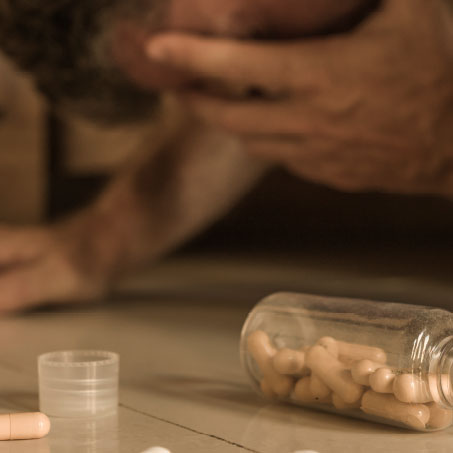The symptoms of
opioid addiction
After using opioids there are changes that happen in the body almost immediately as well as changes that develop over time.
An opioid addiction can affect both physical and mental health, and it is really important to be aware of the short- and long-term effects of opioid use so that help can be found early to prevent further complications.
Opioid medications can relieve pain and make people feel happy and relaxed. However, opioids also cause short-term effects that can be harmful, including:1

With long-term misuse,
opioids can have serious and lasting consequences for someone’s health.
The long-term
health effects OF opioid misuse
Digestive system problems
Respiratory problems
Cardiovascular problems
Mental health problems
Infections
Digestive system problems
Long-term opioid use can lead to regular problems in the digestive system, including chronic constipation, nausea, vomiting, stomach cramps, and bloating2

Respiratory problems
As well as slowed breathing, long-term opioid misuse can increase the risk of an overdose that causes complete respiratory arrest. If not enough oxygen gets to the brain, this can lead to coma, brain damage, and even death2

Cardiovascular problems
Using opioids increases the risk of heart rhythm issues, including atrial fibrillation, which can lead to a stroke, heart failure, and even death2

Mental health problems
Long-term opioid misuse can increase the chances of developing anxiety disorders or depression, which can add to the physical and emotional pain and feed into the addiction2

Infections
Injecting opioids increases the risk of infectious diseases like HIV and hepatitis because sharing needles and other injection tools easily spreads these infections2

Opioid overdose:
What happens
in the body?
An opioid overdose happens when the body is overwhelmed by the opioid’s effects, which lead to life-threatening changes in the body.
When someone takes too much of an opioid, the drug slows down the central nervous system, including the respiratory system. This can lead to slowed breathing, which can eventually stop altogether.3
If breathing stops for too long the brain will not get enough oxygen, causing permanent damage or death.4
How does an
overdose occur?
An opioid overdose can happen when someone takes a higher dose than their body can tolerate. This may occur unintentionally, if someone misjudges the strength of the opioid or combines it with other substances, including alcohol.3
The risk of an overdose is also very high when using heroin because it is often mixed with synthetic opioid. The strength of the drug might be much greater than expected but it can be impossible for someone to know this before using.5

During detox, THE RISK
of overdose
is even greater
The risk of overdose is also higher during the detoxification process, when someone is trying to quit opioids.
As the body is adjusting to the lack of opioids it loses its tolerance and can become more sensitive to the effects of the drug.6
Also, people who are detoxing can be at risk of taking more opioids in an attempt to relieve withdrawal symptoms.

The signs of an
opioid overdose
This is the most important symptom to watch for.3 If someone’s breathing is very slow or shallow, it could be a sign of an overdose.
Slowed or
shallow breathing
This is because not enough oxygen is getting to the skin.7
Blue-TINGED
lips
This is a sign that the pupils are constricted.3
Pinpoint
pupils
This is a serious sign and requires immediate medical attention.3
Loss of
consciousness
If you think that you or someone
else has taken too much opioid,
dial 999 immediately, and stay
with them until help arrives.7
Do not wait for the person to improve; the sooner you seek medical attention, the better the chances of survival.
Remember, every minute counts, so do not delay in calling for help. With quick medical attention, the chances of saving someone’s life are significantly higher.
Understanding the risk
of infections with injected opioid use
Injecting opioids, particularly through intravenous use, can expose individuals to the risk of infections that can lead to serious or life-threatening health problems. These include:8
BLOODBORNE
INFECTIONS:
Sharing needles or other injection equipment can lead to the spread of bloodborne infections such as HIV and viral hepatitis.
SOFT TISSUE
INFECTIONS:
Injecting opioids can introduce bacteria into the skin and soft tissues, potentially causing a local infection or, in more serious cases, an infection that affects the entire body.
The importance of testing:
Taking control of your health
Regular testing for infections is a proactive step in managing health. It allows for early detection and treatment if an infection is found.
Testing services in the UK prioritise confidentiality, and the results are typically shared in a private and supportive manner. Healthcare professionals are there to provide guidance and support throughout the testing process.

Where & how to
access testing
General Practitioner
(GP) Services
GPs can offer testing services for various infections. Schedule an appointment with your GP to discuss your concerns and request the necessary tests.

Sexual
Health Clinics
Sexual health clinics across the UK provide comprehensive testing services, including those related to bloodborne infections.

Drug
Treatment Services
Local drug treatment services often provide testing for infections as part of their comprehensive support.

References
- National Institute on Drug Abuse (2021). Prescription Opioids DrugFacts. [online] National Institute on Drug Abuse. Available at: https://nida.nih.gov/publications/drugfacts/prescription-opioids [Accessed July 2024].
- Mosel, S. (2023). Long and short-term side effects from using opioids. | AdCare. [online] Adcare.com. Available at: https://adcare.com/opioids/long-term-use/ [Accessed July 2024].
- Schiller, E.Y. and Mechanic, O.J. (2019). Opioid Overdose. [online] National Library of Medicine. Available at: https://www.ncbi.nlm.nih.gov/books/NBK470415/ [Accessed July 2024].
- National Institute on Drug Abuse (2021). Prescription Opioids DrugFacts. [online] National Institute on Drug Abuse. Available at: https://nida.nih.gov/publications/drugfacts/prescription-opioids [Accessed July 2024].
- National Patient Safety Alert, July 2023 – Potent synthetic opioids implicated in heroin overdoses and deaths: https://www.cas.mhra.gov.uk/ViewandAcknowledgment/ViewAlert.aspx?AlertID=103236 [Accessed July 2024].
- NICE. (2022). CKS is only available in the UK. [online] Available at: https://cks.nice.org.uk/topics/opioid-dependence/management/management/ [Accessed July 2024].
- Stop The Deaths. (n.d.). Stop The Deaths. [online] Available at: https://www.stopthedeaths.com/ [Accessed July 2024].
- Lavender, T.W. and McCarron, B. (2013). Acute infections in intravenous drug users. Clinical Medicine, [online] 13(5), pp.511–513. doi:https://doi.org/10.7861/clinmedicine.13-5-511.

